Bridge
Crossing into the light, a valediction for Mark Watson
Today is the first day of spring and also the burial day for my beloved partner Mark Watson who died suddenly last month: I’m celebrating Mark in this equinox moment of equal light and darkness because everything you read in this Red Tent series is underpinned by the metaphysical work we did together over 35 years. It comes from a collection of dialogues and practices that began as we set out for Mexico one midsummer day in 1991.
This is almost impossible to write: to sum up the loss of someone who has cherished you for most your life. Such beings are irreplaceable and no matter how evocatively you might write, words fail to convey how it feels when the person you love is no longer in the room, vibrant, alive, physical, radiating warmth, laughter, their voice on the stair, their smile each morning.
Except that, for Mark, presence was his most poignant teaching, one he lived and breathed and demonstrated everywhere he went. Everything he did was to show how it matters that we are fully here in life, in our singular beauty, in our ensemble relations. Because that life, this form, this time, does not come again on this Earth.
Today I’ll be standing up in a woodland burial site in Buckinghamshire where he grew up, trying to sum up this presence and our partnership in a handful of minutes. Beside me will be a coffin woven from banana leaves (a plant he loved to grow) and inside he will lie dressed in the colours of a heartsease flower: purple velvet jacket, a primrose guayabera embroidered with Mexican flowers, his pockets full of seeds from the plants he loved: sunflowers, chillies, anise hyssop, cempaxochitl, wild tobacco …
The flowers were always the bridge into the consciousness he spent his life working to transform. He was a peerless metaphysician, a voyager and scribe of the invisible dimensions, of soul and spirit, but the medium he used to access and navigate these territories was earthy, a planetary language made of leaves and roots, petals and thorns, of scent and sap, wind and bees, and above all sun. The plants root you and connect you, he would say, so you can branch out, and unfurl like a flower. At Dark Mountain’s Spring Sessions Mark was to be the lead teacher and initiate a month’s engagement with people’s local water bodies, with stories and medicine of two of his signature plants, sea kale and hemp agrimony. The sessions were based on crossing the equinox bridge from the underworld dark of winter into the creative light of spring, and his Plant Dialogues would key everyone into the sap-rising green world: the ancestor brassica moored in the shifting shingle by the North Sea a fluffy sunflower on the Minsmere river, bringing fluidity into minds made rigid by civilisation. Holding on, whilst letting go, as he used to say. The paradox at the heart of transformation.
These Dialogues came out of many years’ exploration into future-looking relationships with wild and medicine flowers and trees. The plant practice, as we called it, followed a decade of our travelling, mostly in the Americas, where we had undertaken the hard letting go of the dark histories stored in our bodies and dreams, the mindsets, archetypes and gods that hold us ransom, and begun to thread ourselves back into the physical and imaginative fabric of the Earth.
The plants had originally appeared in our dreams as doors, ways out of these legacies and these flower dreams acted as reference points in all our work. What was striking about the flowers that they were always in colour, where the dreams themselves were in monochrome, encased in cities and buildings. There were many examples but I had to choose one, it would be about the midsummer herb, St John’s wort.
Here’s the dream: I am in a shopping centre without exits, there is no natural light or sky, or anything growing there. All the lifts are broken. I go down a escalator into an Underground station and enter one of those old-fashioned control hubs, surrounded by glass windows. As I do the screens in the room go haywire and alarms sound very loudly, sending panic everywhere, like an ants’ nest that has been disturbed. I realise I have disrupted the programme, and rush out to escape the consequences. Among the frenzy, I suddenly notice a corridor with a light at the end. It is a door! I run towards it and into a back alley, into full sunlight. There is light everywhere.
‘There is no place where I am not!’ I boom when I originally tell Mark the dream. ‘Oh, he exclaims, ‘that’s very exciting. I want to see that plant!’ and we laugh.
Flowermind

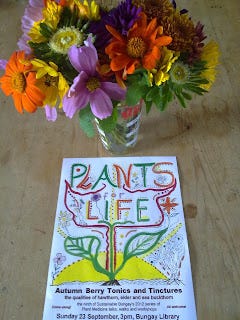
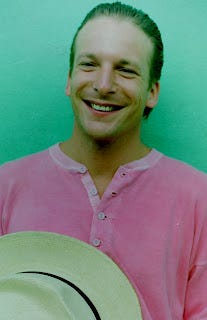
The writer Tom Robbins once wrote that the next epoch would be ‘The Age of Flowers’. Human beings, he said, posses three kinds of brain: the reptile, the mammal – the midbrain – and the flower-powered neocortex. In the Age of Flowers the ancient fight between the mammal and dinosaur brains would cede to the visionary leadership of the neocortex. The neocortex fits like a swimming cap over our heads and receives its impulses and information directly from the sun. All inspiration happens in this part of our brain. I used to imagine it like a flowery swimming cap women used to wear in the ’60s. Certain flowers lighting up certain parts of our minds.
In many ways that ‘ancient fight’ epitomised the struggle Mark had every day with the heartless frequencies of the rational mind and its unholy alliance with the will: with civilisation’s haughty spirituality, with human beings’ self-obsessed tribal allegiances and all their fancy illusions. We called it ‘flowermind’, or ‘kind mind’ - a retuning of the world. He knew nothing would change on the outside, unless we radically altered our internal structures and become different people. And although, like many young men, he desired fame and fortune, to be known as a singer, an actor, a linguist, a healer, his older self chose a different path, to use those talents in ordinary and invisible ways, so that the future could prevail.
When we first met in London we loved the books by Carlos Casteneda and the rigorous way he had left his old city life behind and learned to be a metaphysical warrior on the borderlands of Arizona and Mexico (where we would live years later). In one of the books, as the apprentice Casteneda bids his seer teacher, don Juan farewell before taking a leap into the unknown, he asks why he followed the ‘path of heart’. And don Juan replies: for my beloved, the Earth, and the liberation of the human spirit.
Holding the World Beloved
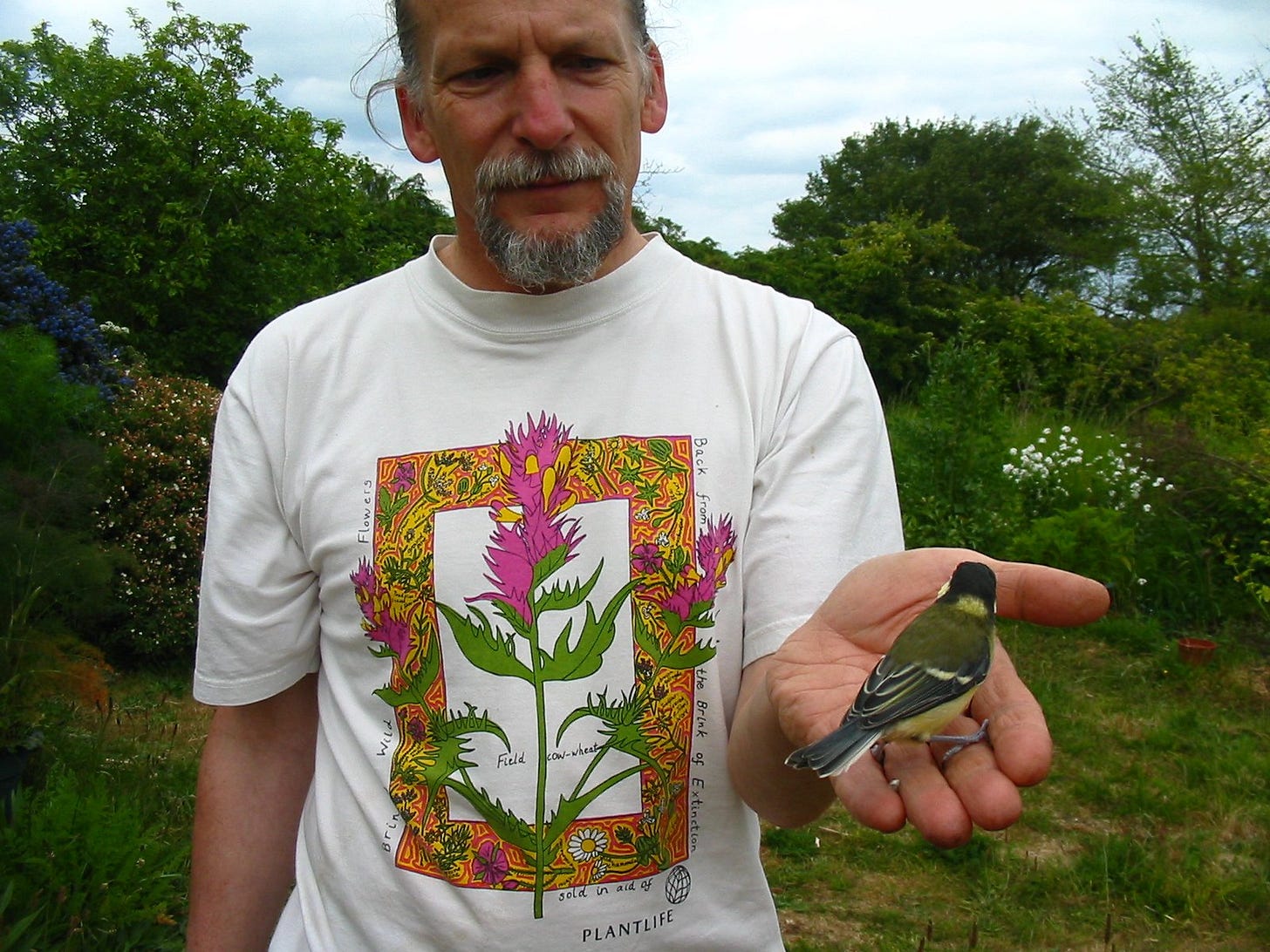
What can you say about an extraordinary life lived ordinarily? What can you say about a man who would stop the car to rescue a butterfly caught on the windscreen, or a bee on the road, who could hold any bird that flew into the house and free them (including once a sparrowhawk)? His strong honey-jar-opening hands shaped delicious wild leaf fritters, fermented vegetables, herbal refreshers and flower teas; he ushered hundreds of sunflowers and morning glories into gardens, collected seeds from everywhere, and proofed hundreds of texts, so they could shine. And those gentle intelligent hands packed thousands of books and took them to the post office. Almost every day for 12 years.
He held the fort, he held the line, like the sustained foundation note, the drone, that underpins some music, so that the melody can soar above. Like the magnetism of earth, so the birds can navigate their flight.
Admin is an unsung task, though it is the engine that runs all civilisations, and certainly if anyone were to speak of Dark Mountain, they might not mention this baseline harmonic, except perhaps in terms of its usefulness. But this winter, he turned to me and said: I have decided to pay full attention to every package I send out and wish it well for Dark Mountain. It’s what I can do.
That attention was formidable, which is why we were able to work so well in the invisible realms. the dreaming of things. He was a fearless anchor in an ocean of swirling thoughts, the dangerous emotional currents of a hostile world. He created a space that allowed inspiration in others, for things to be let go of and meaning to cohere (‘You are an allow master’, someone in Mexico once told him - at which of course he laughed). For decades, we stayed with the trouble before we knew of Donna Haraway’s key stance, a position that grants the self time and space to negotiate past furies and open up to a life-centred future for all beings (not just human). Through the years we lived in the margins, having those dynamic dialogues, weathering eviction, deportation and the UK benefits system, as community activists, as event managers, as ‘just there’ people, renters in second hand clothes in a feudal countryside. He did not give up. And because of him, nor did I.
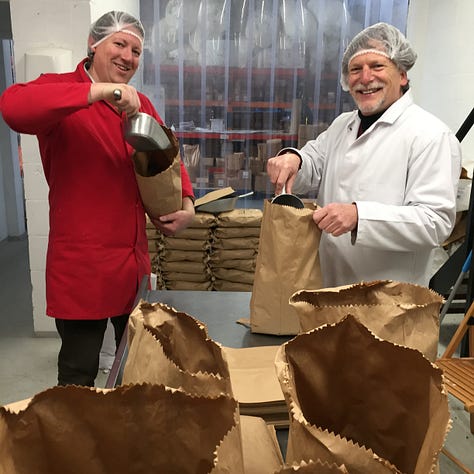

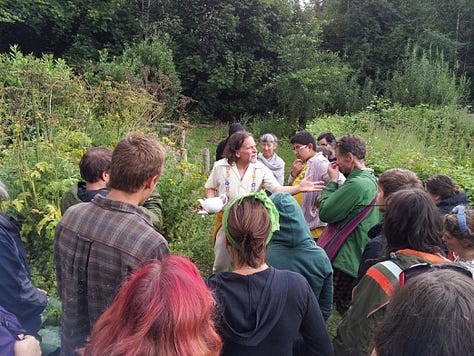
That future of flowers was shaped and emanated by Mark’s show: colourful, open-hearted, joyful, energetic, funny. A ceilidh light show that could only come out of a life spent wrestling in the darkness of the kiva. He was always friendly, always greeting and speaking with people, laughing with growers and mechanics, helping the Dark Mountain subscribers. I do not want to live in a future, he would say, if Wendy from the Post Office is not in the room. He loved dancing and singing, French inks and English chips, a glass (or two) of wine at six, our little black cat and me. And although he stepped into many people’s lives as a stranger, he had a magnetic capacity to make everyone feel instantly at home, to belong to life, to feel we mattered. A Dionysian in an age that worships the Olympian. A beautiful man. A meeting with him always led to a better mood. It was hard to feel ‘less than’ around him.
If a man can leave a legacy to sustain in this world, Mark’s would be this: to hold an embodied, deep heart practice in our everyday lives, to find the sun’s doorway in all the stuck underworld places, and open ourselves up to a very different kind of future on Earth, one flower at a time.
He will be utterly missed.
If you would like to contribute to Mark’s Tribute Fund to continue his work with plants for the future, you can find all details here. Many thanks!
NOTE: Dear subscribers to The Red Tent: I do apologise for this unexpected break in the twice-monthly schedule. We will be back in April with further explorations into metaphysical territories, uneasy chairs and dancing floors. Thank you all for your patience and understanding, and for your kind messages.



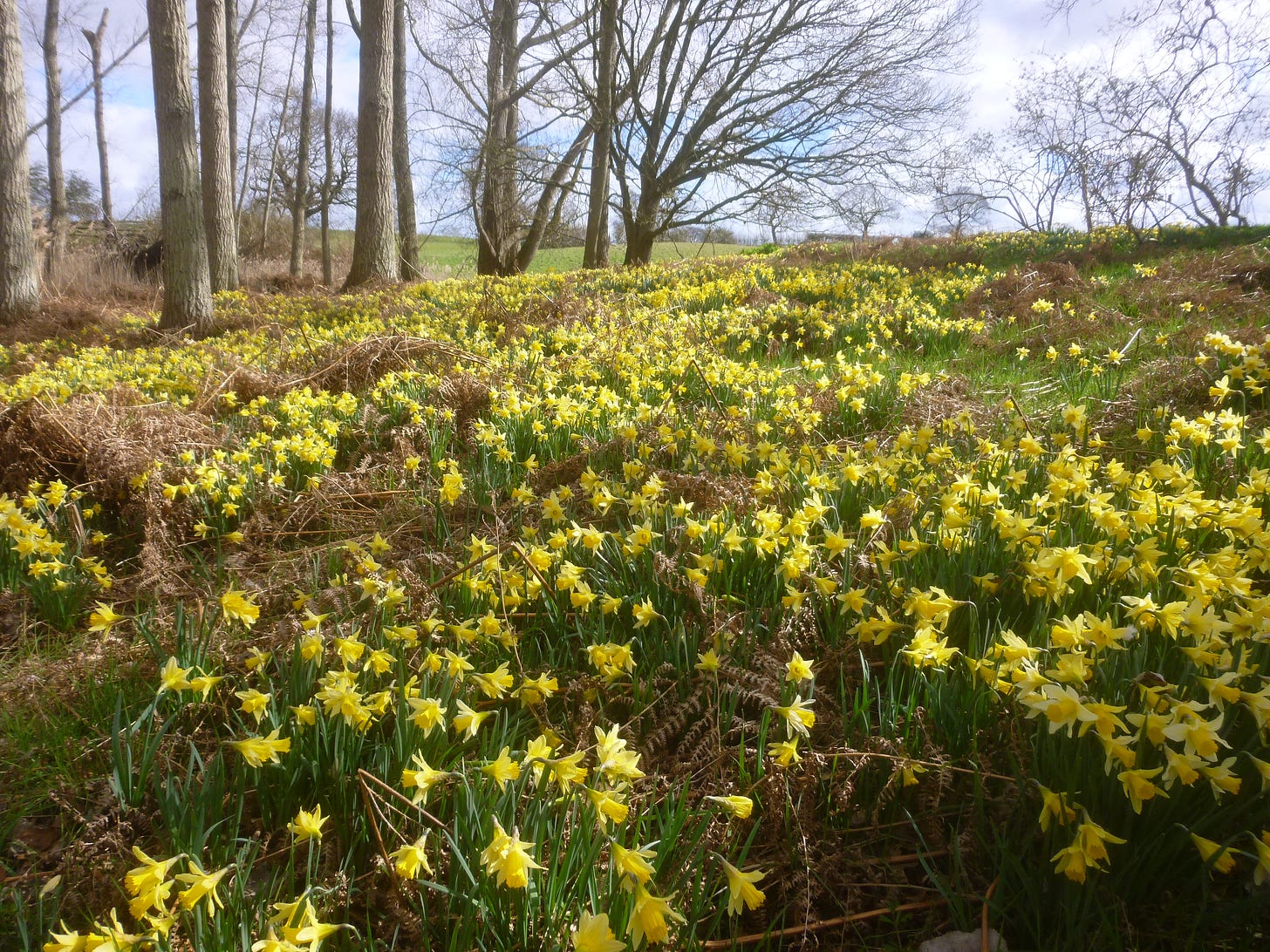
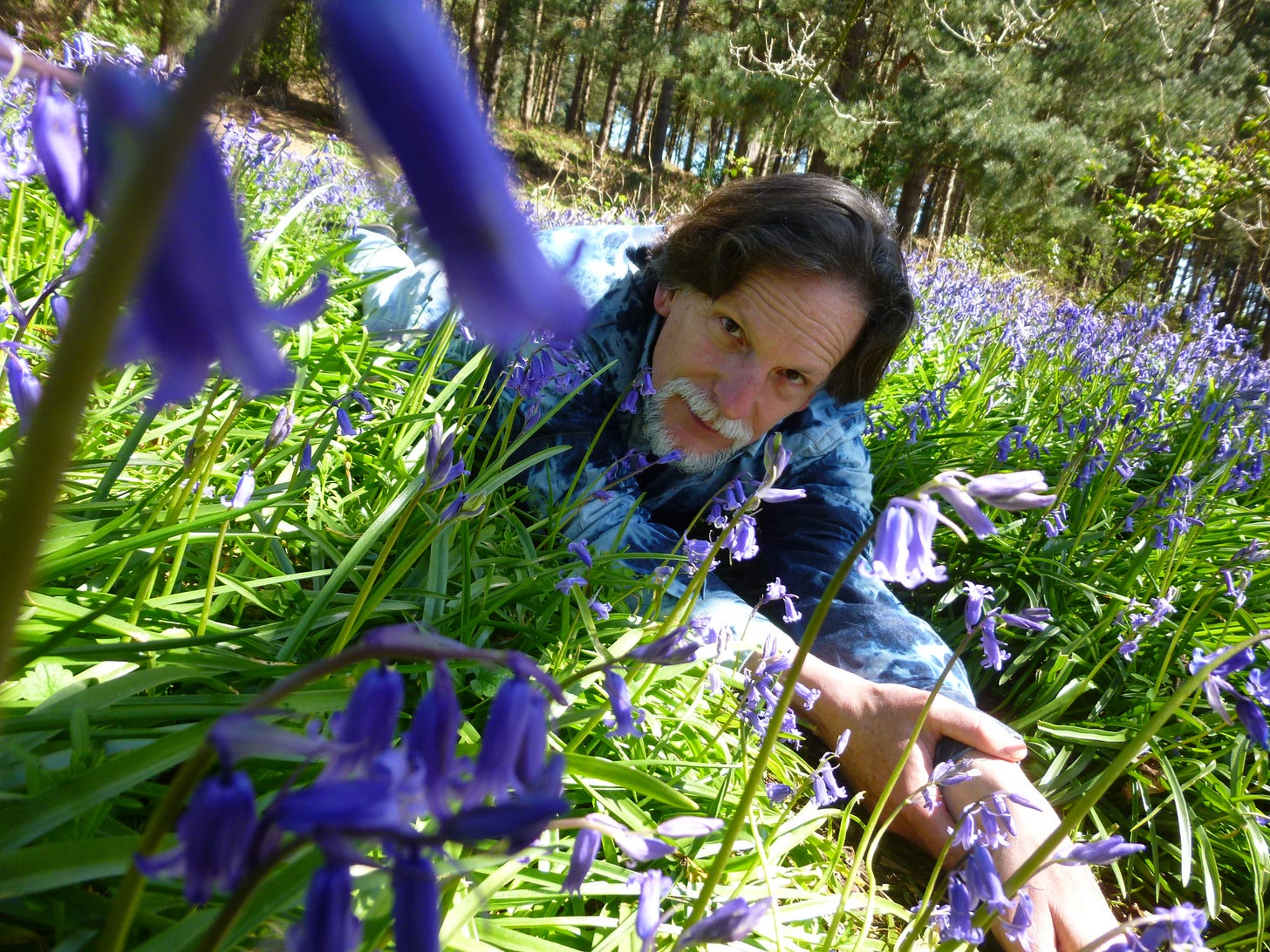
I have no words for the depth of sadness, gratitude and astonishment that I feel reading this piece about Mark's gifts and example. Amazed by your ability to write this tribute with such lucidity and convey Mark's wisdom and spirit, the complexity of his hard-won understandings. Huge love to you during this time of such change and loss.
“What can you say about an extraordinary life lived ordinarily? What can you say about a man who would stop the car to rescue a butterfly caught on the windscreen, or a bee on the road, who could hold any bird that flew into the house and free them….A Dionysian in an age that worships the Olympian. A beautiful man. A meeting with him always led to a better mood. It was hard to feel ‘less than’ around him.”
So beautiful, thank you for sharing your understanding of him. To not understand or have context for someone who lives like this feels like a crime. I can honestly say that I felt that last bit even over zoom.